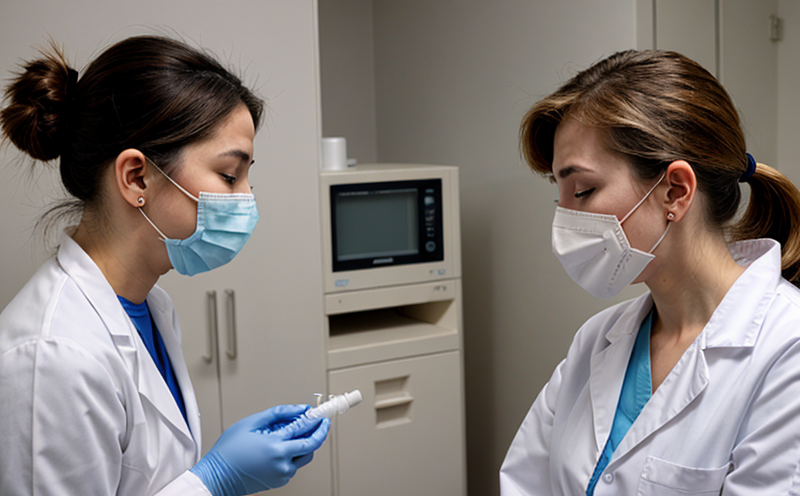Vaccine Potency Testing in Veterinary Immunology
The development and testing of vaccines are critical to ensuring the safety and efficacy of medical products used in veterinary immunology. Vaccine potency testing plays a pivotal role in this process, as it helps determine whether the vaccine meets the required standards for protection against specific pathogens. This service is essential not only for manufacturers but also for regulatory bodies responsible for approving new vaccines.
Vaccine potency testing involves several steps that ensure the vaccine contains sufficient quantities of active ingredients to provide effective immunity. The first step in this process is selecting an appropriate animal model, which is crucial because different species may respond differently to the same vaccine formulation. For instance, a vaccine designed for dogs might not produce the same immune response in cats or birds.
The potency test typically involves inoculating animals with varying doses of the vaccine and then monitoring their immune responses over time. This can be done through various methods such as measuring antibody titers or assessing cellular immunity via interferon-gamma release assays (IGRAs). These tests help determine the minimum dose necessary to elicit a protective immune response.
Once the test results are available, they are compared against established standards set by regulatory agencies like the World Organisation for Animal Health (OIE), the European Medicines Agency (EMA), or the United States Food and Drug Administration (FDA). Compliance with these standards is essential to ensure that the vaccine is safe and effective.
Another critical aspect of vaccine potency testing is ensuring that the manufacturing process adheres to Good Manufacturing Practices (GMP) guidelines. This includes maintaining sterile conditions, controlling temperature during storage, and using validated processes for formulation and filling. Any deviation from these practices could potentially affect the stability and efficacy of the vaccine.
It's also important to note that vaccine potency testing is not just about measuring the presence of antigens; it also involves assessing their immunogenicity. This means evaluating how well the vaccine induces an immune response in the recipient animal. Immunogenicity studies often involve challenges with live pathogens or synthetic antigens and then analyzing the resulting immune responses.
In conclusion, vaccine potency testing is a multi-faceted process that requires careful planning and execution to ensure accurate results. By following established protocols and adhering to strict quality control measures, laboratories can provide reliable data that contributes significantly to the development of safe and effective veterinary vaccines.
Industry Applications
- Vaccine manufacturers: To comply with regulatory requirements and ensure product quality.
- Regulatory bodies: For approval of new vaccines before they can be marketed.
- R&D teams: To optimize vaccine formulations for better efficacy and safety profiles.
- Animal health organizations: To support the development of vaccines against emerging diseases.
Quality and Reliability Assurance
The quality and reliability of vaccine potency testing are paramount in ensuring that veterinary medicines meet stringent regulatory standards. Our laboratory adheres to international standards such as ISO 17025, which ensures that we maintain high levels of expertise, state-of-the-art equipment, and strict adherence to procedures.
To further enhance our quality assurance processes, we employ certified professionals who undergo regular training to stay updated on the latest developments in vaccine testing methodologies. This continuous education helps us refine our techniques and adapt to new challenges posed by evolving pathogens and changing regulatory landscapes.
In addition to internal audits, external accreditation bodies periodically review our operations to verify compliance with best practices. These reviews help identify areas for improvement and maintain our commitment to excellence in every aspect of vaccine potency testing.
Our reliability assurance program includes robust quality control measures at each stage of the testing process. From specimen handling and preparation to data analysis and reporting, we implement rigorous checks to minimize errors and ensure accurate results. This dedication ensures that clients receive reliable data they can trust when making decisions about product development or compliance strategies.
By focusing on quality and reliability, our laboratory provides peace of mind for manufacturers and regulatory bodies alike. We are committed to delivering the highest standards in vaccine potency testing to support the global effort towards animal health improvement through innovative vaccines.
Use Cases and Application Examples
Vaccine potency testing serves various purposes within veterinary immunology, including:
- Evaluation of New Vaccines: Ensuring that newly developed vaccines meet safety and efficacy criteria before being introduced to the market.
- Batch Release Testing: Verifying that individual batches of vaccine are consistent with established specifications.
- Process Validation: Confirming that manufacturing processes remain stable over time, ensuring batch-to-batch consistency.
- Diagnostics: Assisting in diagnosing vaccine failures or suboptimal responses observed in field trials.
For example, when a new rabies vaccine is being developed for dogs, our laboratory would conduct potency tests using standardized protocols. These tests involve inoculating groups of dogs with different doses of the vaccine and monitoring their immune responses over several weeks. The results help determine the optimal dose required to elicit protective immunity while minimizing adverse effects.
In another scenario, a company might use our services for batch release testing on its annual supply of leptospirosis vaccines. By comparing potency levels across batches, they can ensure uniform quality and efficacy without compromising on cost or time efficiency.
Process validation studies are also common among R&D teams looking to refine their manufacturing processes further. Our expertise in vaccine potency testing allows us to provide valuable insights into process improvements that could enhance overall performance.
Diagnostics play a crucial role when field trials reveal unexpected results or failures. In such cases, our laboratory can conduct detailed analyses aimed at identifying potential issues within the vaccine formulation itself or during its production.





